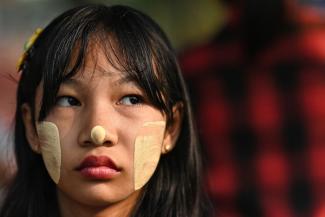
Manan Vatsyayana/AFP
Since the 2021 coup d’etat, the actions of Burma’s military regime against the citizens of Burma have resulted in the widespread deterioration of political and human rights, the economy, and human development. Thousands of civilians have been killed or detained; and increasing violence between the military and armed groups has displaced nearly 3 million people as of June 2024, resulting in one of the world’s most challenging humanitarian crises.
Enacted by the United States Congress, the 2022 Burma United for Rigorous Military Accountability (BURMA) Act, demonstrates the continued U.S. commitment to the people of Burma in the midst of the current political crisis and civil war. USAID is at the forefront of implementing the BURMA Act and working to help Burma restore its path to inclusive, representative federal democracy.
USAID is also reaching millions of people through critical assistance to bolster health services, food security, economic growth, education, and basic government services. USAID will continue to engage with international and community partners to help alleviate human suffering and empower communities.
USAID's Accomplishments:
- Democratic Governance: As authorized by the BURMA Act, we support activists, minority ethnic service providers , civil society, women, and youth groups. USAID's ongoing support to these individuals and entities is critically important as they continue to strive for an inclusive and democratic future. USAID supports democratic values and fundamental freedoms through strengthening governance, civic engagement, and independent media.
- Food and Sustaining Economic Development: More than 70% of the population depends on agricultural activities for their livelihoods. With the country facing inflation and limited access to markets, USAID works to advance the resilience and productivity of farmers and local communities. USAID delivers assistance to thousands of farmers so that they can purchase seeds and fertilizer ahead of the growing season. USAID supplements these agriculture support activities by providing grants and technical assistance to micro and small businesses that are committed to supporting vulnerable communities – helping expand livelihood opportunities in non-urban and ethnic areas. We also work to foster private sector transparency and counter market corruption.
- Education and Health: USAID works with students and teachers to drive learning outcomes and provide access to higher education through scholarships to universities across Asia and the United States. In total, our education activities support more than 300,000 youth. In the health sector, the coup and ongoing conflict that affects civilians have reversed decades of progress and positive trends in public health. Burma now has the third highest number of people living with HIV in Southeast Asia and since the military coup, malaria cases have risen by 170%. To save lives, USAID is increasing the availability, affordability, and utilization of high-quality health services for vulnerable and underserved communities. We are scaling-up innovative approaches, and delivering services and treatment to those who need it most.
- Human Rights and Accountability: The BURMA Act directs U.S. efforts to hold the regime and its supporters accountable for violations of human rights. To promote human rights and accountability, USAID is documenting and responding to human rights violations. We collaborate with local partners to help ensure that those affected by abuses receive the support and justice they deserve.
- Humanitarian Assistance: USAID's Bureau for Humanitarian Assistance is the largest humanitarian donor in Burma, working through partners to deliver life-saving food and cash assistance, nutrition, health, shelter, protection, and water, sanitation, and hygiene services to highly vulnerable populations based on assessed needs.
The United States will continue to stand and partner with the people of Burma to advance a just, peaceful, inclusive, federal and democratic Burma.
